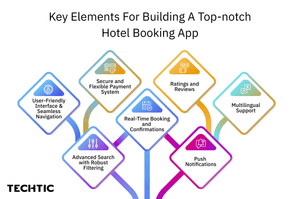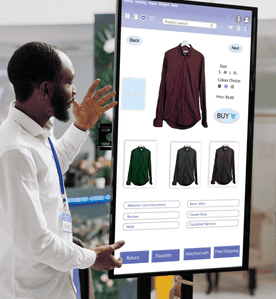A Quick Guide to Hotel Booking App Development
Sector: Digital Product
Author: Nisarg Mehta
Date Published: 05/15/2024

Contents
The increase in mobile internet use has particularly contributed to the growth of hotel booking apps. The market for mobile-based travel platforms is more consuming than ever, with over 4.68 billion mobile internet users globally set to be online by 2024.
Because it is increasingly simple to include additional services in a smartphone app, such as the ability to reserve air travel, rent automobiles, and select or prepay for meals, consumers are more likely to opt for integrated solutions for planning their trips and accommodations.
According to a report by Tripadvisor, 17% of people in the United States have bought some form of travel app subscription to plan their travels AssetImage requirements.
Moreover, Statista states that the Travel app market would continuously increase in total by $0.8 billion (+64 %) between 2023 and 2027.
Given the promising market size and growth, it is a great idea to develop a hotel booking app. Before we proceed forward talking about the hotel booking app development approach and cost, let’s know the different types of hotel booking apps out there.
Types of Hotel Booking Apps
Whether they be in the form of dedicated apps, web based platforms, or voice activation, each app serves different purposes, answering a wide range of traveler needs and wants.
A. Aggregator Apps
Such applications are made up of data from different hotels and booking platforms, which provide users with the opportunity to compare the prices, amenities, and terms of bookings at once. They prospers on enormous data storage and particularly strong search engines and search that produces classification according to the input data of users.
In the past half decade, business has been taken over by aggregator apps such as Booking.com and Trivago that seek to categorize and consolidate the available accommodations so that travelers have a universal view of what’s available on the market.
B. Chain Hotel Apps
Many hotel owners are innovating by developing their own proprietary apps to prompt visitors to book their hotels via their dedicated platforms as opposed to using other booking channels. Apps are very often given reward programs and personalization services with which customer loyalty can be fostered and customers can get a better experience.
Examples of such is the Marriott Bonvoy and Hilton Honors apps which allow their users check in/out online when they are coming or leaving, get special offers, and also redeem their rewards.
C. Boutique Hotel Apps
Selecting a niche and the apps then concentrate on the so-called luxurious recreational spots where people get more personalized and favorable service. They contain in-depth description and exquisite visuals together with each property. For young people dreaming of a good isolation and romantic atmosphere, it will be their ideal destination.
Jennifer Aniston & Mrs. Smith and the Tablet hotels are two such examples providing handpicked lists of boutique hotels around the world.
D. Last-Minute Booking Apps
Last-minute booking apps with the major share of unsold spaces fall just as well for spontaneous travelers who want to get low prices on diluting accommodations. These apps like HotelTonight and Hotwire exploit dynamic pricing and supply found close to the booking date to offer enticing deals. Neither of the two lose out as hotels maximize occupancy, and travelers get to enjoy the benefit of cheap deals at the last minute.
The company will target those types of apps that have public demand and coincide with the firm’s objectives to stand out in the industry of many competitors.
Key Features to Include in a Hotel Booking App
To develop a hotel reservation app and have it successful, taking care of a bunch of crucial functionality is a necessity. By integrating these functions, the app will not only improve the user experience but also simplify booking and ensure success in the market.

User-Friendly Interface and Seamless Navigation
The application’s design should be clear, saving users the hassle of finding a home with various features. Clear presentation, logically arranged features, and fast settings of most commonly used items like search and appointments are the integral aspects in this regard.
Advanced Search with Robust Filtering
As the main feature, the users will be able to choose hotels according to the number of offered criteria which can be a place, price, rating rating, or amenities. Comprehensive filter criteria facilitate the logistics of the decision and allow users to pick their product in the blink of an eye.
Secure and Flexible Payment System
Offering an array of payment options, including credit cards, digital wallets, and direct bank transfers, as well as installing strong encryption for a secure transaction purpose is important in building trust between consumers and providers. The booking process should be the most simple one, if possible, selecting only several taps by the customer to complete a reservation.
Real-Time Booking and Confirmations
Seamless transactions depend on instant confirmation, so the app should allow users to let them know about their bookings. The instant updating of the real-time data concerning room availability and prices also among other things helps to avoid overbooking which therefore leads to the accuracy of the listing.
Ratings and Reviews
A web platform that allows customers to write reviews of their hotel experiences is only what will create user-generated content that contributes to other customers’ decision-making process. This aspect should be given a development priority and reflect the stories of actual usage.
Push Notifications
To give the users a feeling of participating the app can send notifications about upcoming stays, discrepancies in booking status, special offers, and personalized offers on the basis of the user’s booking history and preferences.
Multilingual Support
Multilingual support of the app, on the other hand, can be a great chance to gain more users and introduce the app to the global market, being understandable and comfortable for a wide range of nationalities.
Implementing these components doesn’t only help you to complete the task, but it does much more, helping you to build loyalty among the users and increasing the frequency of application usage. These elements enable the app to be competent and on the forefront of technology as it races with time.
Hotel Booking App Development Process
Hotel reservation app creation is a repetitive process, and the first action is to design a strategy, and at the end, an app is launched. Each stage is useful during the development of the app to ensure it is implemented well, user-friendly, and achieves its objective in the competitive marketplace.

1. Market Research and Planning
The initial step that we should take is to be aware of the target audience. pinpoint the users’ specifications, preferences, and part of the characters that they value most. To get started, do research on competition in order to identify the dry spots on the market or the parts that could be better.
2. Choosing the Technology Stack
It is the right choice of technologies either for frontend or backend is basically important. One important criterion is that frameworks like Flutter or React Native enable cross-platform development for both platforms while developing for iOS and Android simultaneously. The back end may use cloud services like AWS or Google Cloud for purposes of the cloud service such as data storage, booking process, and the management of users.
3. Designing the UI & UX
The system design must be toward the creation of an easy-to-use and interactive interface. The wireframing of each screen hel`ps in creating a structure while user story mapping acts as a guide that guarantees a seamless workflow from task to task.
4. Backend Development
This part entails the configuration of a server, application programming interfaces, and integration with third-party services including payment gateways and CRMs. It is imperative to ensure that your backend is strong and scalable enough to handle the user load given this statistical data.
5. Testing and Quality Assurance
Prior to the app launch, testing must happen with a focus on finding and correcting all bugs. This includes job monitoring, proficiency testing, safety testing, and user-friendly testing. Having real users beta test the app until the launch paving the way for their reviews is a sure way of getting feedback before public release.
6. Launch
From testing, the app could further be launched on either Android or IOS app stores. It is urgent that one arranges for a soft launch through which the app’s performance in a live environment is encountered and therefore adjustments can be made accordingly.
7. Post-Launch Activities
An app goes through post-launch activities like monitoring performance, gathering feedback, and making amendments and updates as a result of this. Marketing also spit flames in the second phase and thus gave rise to an increase in the world full of mobile applications.
Now that we’ve discussed how to build a hotel booking app, let’s move forward to discuss the cost of it.
Key Factors Influencing Hotel Booking App Development Costs
The price of the hotel reservation app may fluctuate greatly and it is going to be determined by different factors as well. Taking into account these factors builds a sound basis for budgeting and managing the project planning process.
App Complexity
The number of features introduced and their complexity has a substantial impact on the cost of the implementation. The minimum for plain applications that offer routing, booking, and reading reviews would approximately cost from $10000 to $20000. The more complex the features are, the more expensive the app can get, and an app with interesting features like AR/VR tours and AI personalization can cost up to $40,000.
Development Team
Both the location where the team of development and its structure are also very significant in this regard of cutting costs. From developers who came from regions with lower living rates to agencies in high-cost companies that are well experienced and more reliable will charge higher rates as well.
Platform Choice
Supporting all of the platforms at once (iOS, Android, web) causes the costs to be much higher. Building an app that is cross-platform can help minimize the costs, but at the same time, it can be impossible to get the performance and design like the one that an application made specifically for this device.
Third-Party Integrations
The development of an interface with other systems will require some extra expenditure, including payment gateways, navigation services, or CRM integrations. Such transactional fees rely on individual service providers and the degree of complexity involved in the integration process.
Maintenance and Updates
Routine maintenance is an integral part of the after-service care aimed for the trouble-free operation of the app. This encompasses more than simply remedying errors, as it also encompasses versions, functionality, and smooth working with new device releases and platform updates. Mostly, it would be in the range of 15-20% annually of the initial development cost.
Marketing and Launch Activities
However, the price of a successful application is the marketing budget that often compromises the advertisement campaigns, cooperation with famous persons, and other different ways to catch the audience’s attention and to stand out among lots of competitors.
To optimize the cost of hotel booking app development, it is advised to work with an agency that can take care of the entire development process as well as help you market the app.
Monetization Strategies
While it’s important for a hotel booking app to not only become popular but also financially rewarding, thus successful monetizing strategies are one of the key requirements. Here are several approaches that can generate revenue. Here are several approaches that can generate revenue:

Commission on Bookings
The app will charge a commission allowance for all the reservations that are completed via this platform. The rate of commission can be different depending on the amount of agreement between the hotel or service supplier.
Featured Listings and Ads
The hotels can advertise their nearest listings by paying money and in turn it will get possible bookings. This process is going to prove to be most effective. Moreover, advertisements in the app as well as other third-party businesses could be added that produces another source of money.
In-App Purchases and Upgrades
It is a very good idea to give users an opportunity to buy other services or modifications as it is a very profitable result. For example, users could take an option for early check-in after paying an extra price for premium deals, exclusive deals, or late check-out time.
Subscription Model
You can streamline earnings by subscription as a way to get a steady income. Subscription will allow you to gain advantages like discounted rates, loyalty points, and other facilities that are not available to users who are not paying a subscription fee.
Affiliate Marketing
The app’s ability to generate revenues is self-evident if it partners with other traveling-related services like airlines or car rental companies in a way that it can earn commission per referral made on the platform. Through this approach, not only revenue increases but the standard of the travel planning system is enhanced by making it a unique and comprehensive one.
It’s the Right Time to Start Developing Your Hotel Booking App
The app development for hotel booking appears to have a bright future, as the travel industry thrives these days. Utilised properly, they can act as a catalyst for clients’ trips while serving as an additional income source for businesses.
Through a concentration on the user experience, brand-new technology, and proactive reaction to the changing commercial space, the app shines on top of this competitive market.
If you’re completely on board with this idea, feel free to reach out to our experts at Techtic. We’ve helped entrepreneurs like you to plan the right app strategy and build it from scratch.



